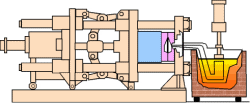Zinc Die Casting Tooling. Zinc die cast tooling has several benefits, which include long tool-life, thus it is cost-effective. It has the ability to produce very thin walls, requires no secondary machining through cast-to-print shapes, and has high tolerance.
An example of zinc die casting tooling is Inventix, a conventional tool that creates highly cosmetic zinc shift handle for the Hummer H2. Through mold flow simulation, a designer is able to create a tooling solution to meet the cosmetic challenge. Secondary operation is eliminated because of high-precision and flash-free zinc die casting.
Through zinc die casting tooling, a company will be able to produce product fitted to the desire of the customer. To produce an intricate zinc key cylinder within budget, a company uses Inventix with an additional 5th and 6th slide position to a 22NT Techmire die cast zinc part.
The tool design includes an extremely in-die degating and tight-tolerance blade design. To eliminate the need for secondary operations the design engineers incorporate two cavities within the tool to boost production. Zinc parts need trim tooling called trim die, which is used to remove the unnecessary zinc surrounding the zinc parts. This process involves placing the alloy into a press with hydraulic forces with enough pressure. Zinc die casting molds, zinc die casting dies, or insert dies are other terms for zinc die casting tooling. It comes in different shapes, styles, and sizes. The price depends on the trim dies and cavity inserts. By employing die cast zinc tooling, as much as 15% of the price can be saved.


